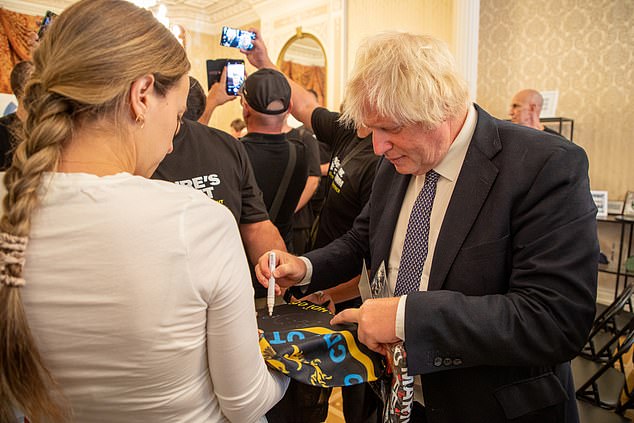If you want to know why the Ukrainians are fated to win their great war for independence, there is only one thing you need to do: talk to them.
Talk, above all, to the heroes who are doing the actual fighting, and you will understand that nothing and no one can tame their longing to be free.
Over the past three years, I have met hundreds of these soldiers, men and women whose terrible injuries are made to seem irrelevant by the indomitable spirit that blazes from their eyes.
I have stood by hospital beds and listened to their boundless confidence in eventual victory, their eagerness to be back on the battlefield – and every time I have felt humbled and amazed.
Yesterday in London I had the privilege of meeting a group of about 25 such veterans, many of whom had fought during the appalling siege of the Azovstal steel works in Mariupol, in the first half of 2022. These guys endured week after week of an inhuman Russian bombardment, cut off from the rest of the Ukrainian forces.
When they could finally fight no more, they were taken into captivity. Many of the men I met yesterday had not only been badly injured in the fighting, they had also been brutally tortured, before being eventually swapped back to Ukraine.
Think of the sacrifice made by those young Ukrainians, mainly in their 20s and 30s; think of the horror and grief of their families, who must have assumed they were dead.
So, I asked them the question I always ask of the veterans. As someone who passionately supports Ukraine, and Ukrainian resistance to aggression, it is a question that, morally, I feel I have to ask. The question is: Was it worth it? All this suffering, all this pain. Is it worth it?

Think of the sacrifice made by those young Ukrainians, mainly in their 20s and 30s; think of the horror and grief of their families, who must have assumed they were dead, writes Boris Johnson

Boris Johnson at the Ukrainian Embassy in London where he met veterans of the war in Ukraine
The answer yesterday was as passionate as I have ever heard, and it was the same as ever.
Yes, it was worth it, so that Ukraine could be free – a thousand times worth it. As one of them said: ‘If I had my time again, I’d do exactly the same thing.’
Putin may theoretically have the numbers (though his advantage here is probably overstated). He may be willing to flout the laws of war and commit atrocities on an industrial scale.
He may have the power to strike at civilian Ukrainian targets in a way the Ukrainians cannot – at present – match.
And yet, for all his North Korean bashi-bazouks (irregular or mercenary soldiers, originally of the Ottoman army), for all his Iranian-designed drones, for all his Chinese chums, I believe the clock is now ticking on Putin’s shameful and misbegotten Ukrainian invasion, and that it will indeed end in failure – either this year or next.
That is partly because the Ukrainians are not only braver and more ingenious than the Russians, but also because – for the first time in months – it feels as though the West is united behind Ukraine. Those heroes I met yesterday are again beginning to dream of eventual victory.
After all the misery and uncertainty that followed the dreadful February White House meeting between Trump and Zelensky, they are daring to hope what I have always believed: that one way or another Trump 47 would live up to the record of Trump 45.
Of all Western leaders, Trump was the first to give the Ukrainians significant lethal weaponry, in the form of the Javelin anti-tank weapons; and that is why I have always hoped and believed he had it in him to come decisively to the aid of freedom and democracy in Ukraine.
Over the past few weeks, my optimism has deepened because something has unquestionably changed. There has been a real hardening in his language about Putin, a real sympathy for the plight of the Ukrainians.
After a bizarre glitch in the Pentagon, when some MAGA official seems unilaterally to have paused the flow of some weapons, the kit is flowing again. The Ukrainians are getting more of the Patriot missile defence systems they so badly need, as well as other crucial technology, such as ATACMs.
The total package of American assistance is worth another $10 billion and, though the bill is being footed by the Europeans, that seems only fair because, so far in this war, the US taxpayer has paid more for military support per capita than their European counterparts; and, as Trump has reasonably observed, Ukraine is in Europe, not America.
At the same time, Trump is starting to threaten some pretty punitive sanctions. There is every chance that Congress will pass Lindsey Graham’s bill for secondary sanctions on any country trading with Russia – imposing a swingeing 500 per cent tariff.
But even before that Bill comes into effect, Trump has partly anticipated the measure – threatening 100 per cent tariffs on Brazil, India, China and any other country still buying energy from Russia by September 2. That is not long away. Above all, we have seen the change in the President’s attitude, the change in tone. In one recent conversation with Zelensky, Trump actually seemed to canvass the idea of Ukraine striking at Moscow itself – just as Russia can strike at Kyiv. And though the White House rapidly back-pedalled, it was striking that Trump was even prepared to entertain the thought.
So, what has changed? What is happening? Some US senators mention the influence of Melania, Trump’s Slovenian-born wife. ‘Every time he has a phone call with Putin, Melania tells him, ‘Putin’s a liar’.’
Some say Trump has been personally disgusted by Putin’s continuing willingness to slaughter civilians, especially children.
Perhaps there is truth in both suggestions, but I think it is simpler than that.
If you want to know what Trump is going to do, look at what he says he is going to do.
Long before the US election, Trump made clear that he would offer both sides a deal. If the Ukrainians refused, he would stop supporting them and stop the flow of weapons. If the Russians refused, he would double down on supporting Ukraine.
That is more or less what is now happening. The deal Trump offered the Ukrainians was in many ways harsh. They had to agree to allow America access to their mineral deposits. They had to accept that Nato membership was off the table, at least for the time being.
Most painful of all, they had to accept they would not be able to recover all their land, at least in the immediate future. Zelensky had the wisdom to accept a ceasefire on those terms.
Putin has turned it down – again and again. It looks as though Trump has finally had enough.
Russia will struggle to make much progress this summer, in a battlefield where it is broadly easier to defend than to attack.
Standing behind them, the Ukrainians now have the advantage of a united Nato, led by a US president who cannot afford – morally or politically – to allow himself to be bested by Putin, and who plainly has the guts to bring the war to an end.
And Trump has the inestimable advantage that he is backing Ukrainians like the veterans I met yesterday – men and women who will not rest until their country is free, sovereign and secure for the long term.











